To date, artificial intelligence, the Internet of Things, and blockchain are the top 3 most promising technologies for business. Covering all the possible benefits and use cases of this winning mix is almost impossible, so let’s focus on the ones artificial intelligence may promise. In this article, we will find out why is AI important to business and how does artificial intelligence affect business in 2024 and beyond.
What Is Artificial Intelligence in Business?
Artificial intelligence as a general term refers to the set of smart tools, technologies, and algorithms designed to solve the tasks usually solved by humans. To date, artificial intelligence models are quite smart; their capabilities have already gone beyond the ones of their creators. They are able to process enormous amounts of data, find and extract invisible patterns, make accurate and data-driven predictions, understand human speech and handwriting, and much more. Usually, the concepts of artificial intelligence, machine learning, and deep learning are used interchangeably, however, they have significant logical and technical differences. Artificial intelligence is a general term converting machine learning and deep learning, while the latter two concepts are the stages of AI evolution.
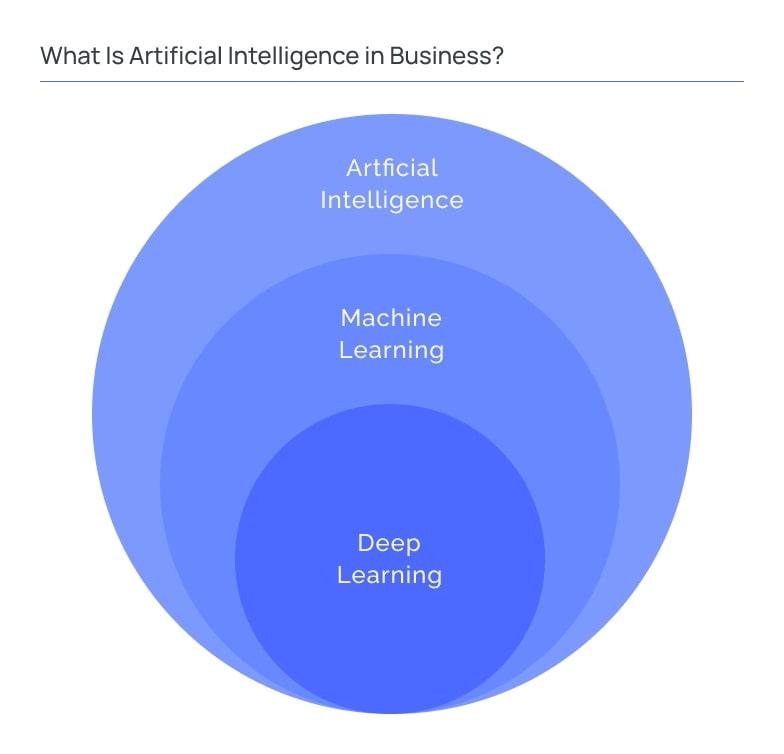
- Machine learning is an algorithm that can process data and make conclusions according to the parameters set by the developers. For example, this is how fraud detection in banking works. The ML algorithm knows the signs of lawful transactions and each time the transaction happens, it makes sure of “positive” behavior patterns.
- Deep learning. Deep learning is the next step of machine learning development. The core idea behind it is to empower the machine with independent logic and neural connections to let it think in the way the human brain works. Deep learning models have object recognition, Natural Language Processing, speech and character recognition capabilities. DL algorithms are much more powerful compared to ML ones since the latter can work with structured data and embedded knowledge only, while a deep learning model can self-learn and improve itself in the process of accessing new knowledge.
How AI Is Changing Business?
If to refer to AI meaning in business, using it for business processes means accessing and unlocking the ultimate potential of data analysis. Data is a fuel that makes artificial intelligence work for the business’s benefit. AI is transforming business intelligence, and that’s why more and more companies develop and adopt AI solutions to better meet their business needs.
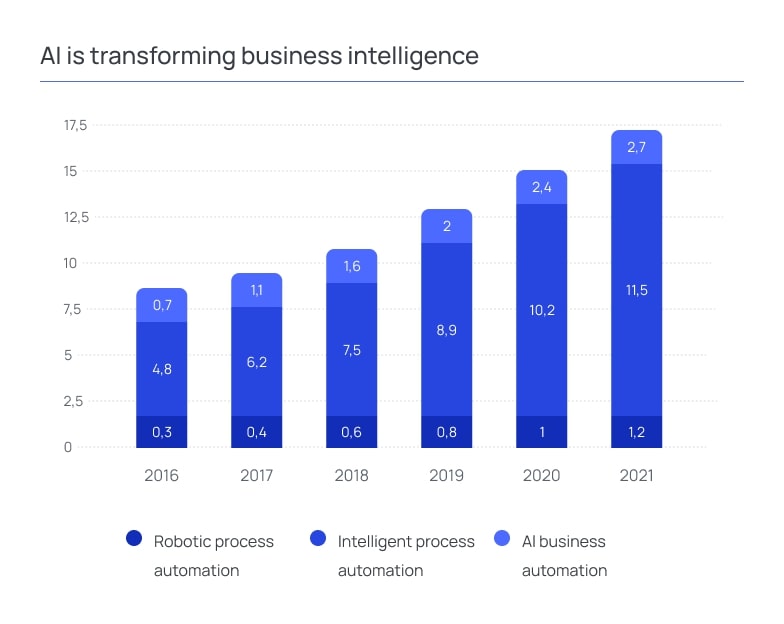
- Experts predict that AI adoption by businesses will let them gain $2,9 trillion in business value.
- To date, only 7% of companies aren’t using AI but still, look forward to developing AI adoption strategies.
- By 2030, the estimated contribution to the global economy from AI is expected to reach $15,7 trillion.
Modern Ways to Use AI in Business
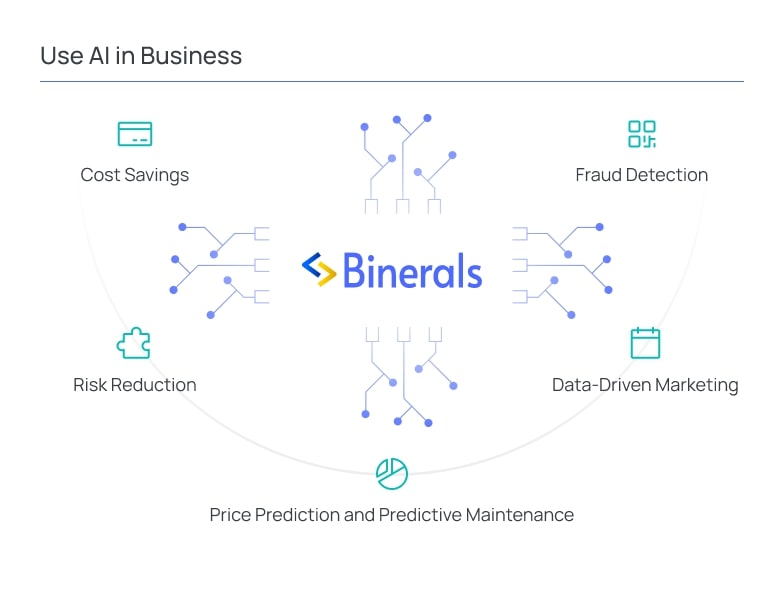
How AI can be used in business? There are a lot of value-driving opportunities that may be perfectly tailored to the specifics of the industry and business process. Below are just some of the ways of how to use AI in your business.
Price Prediction and Predictive Maintenance
The opportunity to predict the winning price is a top-notch benefit for retail and eCommerce companies. To cope with this task, smart algorithms analyze the whole set of current and historical data, including but not limited to current pricing offerings and the ones of competitors, the solvency of the target audience and their sentiments, potential supply and demand based on the data from the previous period of time, shopping trends, and a lot of invisible patterns and details. What are the benefits of AI for businesses engaged in manufacturing and production? They can also use the predictive capabilities of AI to maintain their production lines. In this case, artificial intelligence works in conjunction with the Internet of Things. Smart sensors control the way equipment works and make smart conclusions about the necessity to replace a spare part before it breaks and results in downtime.
Fraud Detection
The possibility of online fraud detection is a cutting-edge opportunity for the financial and eCommerce industry. This AI use case becomes especially relevant on the background of online scams rise provoked by unprecedented eCommerce growth in 2023.
Risk Reduction
AI-powered data analysis and predictions can also be used for companies engaged in investments. For example, private investors, banks, cryptocurrency, and real estate traders may use it to better understand and evaluate the investment decisions risk. In this case, AI may take an unbiased look and make an emotions-free conclusion based on smart data analysis only.
Data-Driven Marketing
Marketing and sales departments consider AI to be the most effective technology for launching data-driven and personalized marketing campaigns. Content personalization, smart recommendation, data and behavior analysis, marketing campaigns automatization aren’t a complete list of tasks AI can cope with.
Cost Savings
The opportunity to save costs by optimizing business processes, achieving better productivity, and predicting winning trends is one of the most significant advantages of artificial intelligence in business. 44% of businesses reported significant cost reduction after adopting a mix of artificial intelligence and entrepreneurship.
Inspired by the opportunities AI may open up for your business? Consider creating a custom AI solution to perfectly meet your business needs.
Discuss My ProjectExamples of Artificial Intelligence in Business
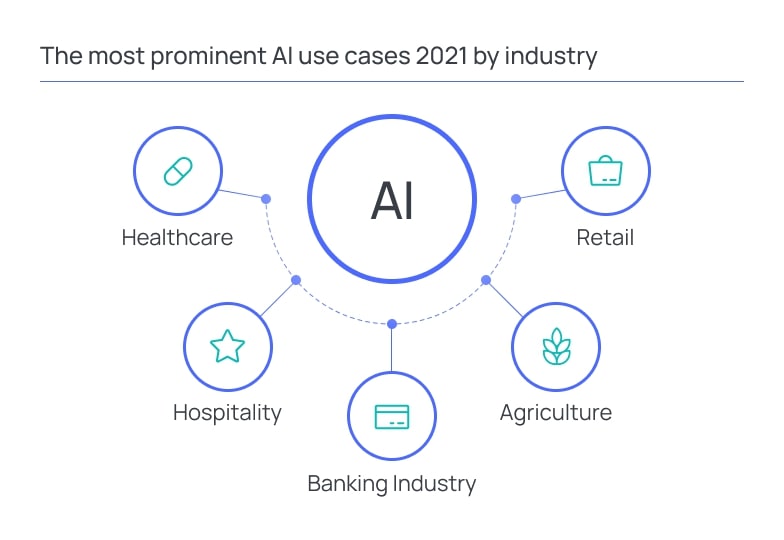
How to implement AI in your business? Get started by reviewing real-life use cases of artificial intelligence and machine learning by companies from different industries.
Banking Industry – Chatbots
Chatbots aren’t the only way to use AI in the financial industry. AI is the most effective tool to improve the mobile banking experience, provide instant response time, save on customer support service maintenance, keep users updated on their balance, help them manage their payments, plan budget and make smart investments. For example, Erica, a chatbot created by the Bank of America is quite useful for assisting customers with making and scheduling their payments.
Healthcare – Smart Assistants
Why is AI important to business from the healthcare industry? AI-powered applications may significantly increase the quality of medical care by accurate data analysis when diagnosing, healthcare data collection in EHR and health tracking apps, the use of wearable devices and self-diagnosing apps, smarter planning of hospital capacity, and more centralized emergency response. For example, Oncora AI helps doctors store and analyze cancer patients’ data in one place and develop personalized treatment plans with the aim of improving clinical outcomes. There are also a lot of solutions developed in response to Covid-19, for example, the ones for medical imaging and lung damage detection, or contactless delivery of medicines from one hospital department to another.
Ready to empower your job search platform with some of the features above?
We Can Do ItHospitality – Planning and Waste Reduction
Hospitality and catering have been hit hardest by the pandemic. Now, they are on the road to recovery, increasingly appreciating the artificial intelligence role in business. For example, Winnow Vision is a solution equipped with a computer vision that can help reduce food waste in a restaurant. They analyze discarded products, discover patterns, and provide owners with valuable insights. Hotels, in turn, may reduce the necessary staff by replacing some jobs with robots. Artificial intelligence can also help them better plan the hotel capacity according to the new safety requirements, predict cash flow and suggest ways to stay competitive.
Agriculture – Improving Harvest
Robotic solutions embedded with computer vision may be successfully used in the agricultural industry with the aim of improving harvesting, and optimizing water and soil usage. For example, there are RPA solutions able to distinguish a useful plant from a weed, and carefully extract the latter, calculate the amount of water needed to irrigate a particular crop under certain conditions, and develop smarter strategies for increasing yields without the use of chemicals.
Retail – Sales Funnel Optimisation and Smart Marketing
Retail and eCommerce are the industries that can make the most use out of artificial intelligence. The use of recommendation engines is the simplest example, while the benefits of AI for business from eCommerce and retail industries are almost unlimited. They may improve customer service via chatbots, analyze users’ sentiments and feedback, track their behavior on the website and in a mobile app, automatize marketing campaigns, improve shelf layout in a physical store, use in-store robotic assistants, and much more. This is how can AI help small businesses since introducing AI in the marketing processes of small companies is quite affordable to date.
Feel like you also need a custom AI solution for your company? We can create it for you.
Get Our SupportAutomotive Industry – Semi-Self and Self-Driving Cars
Semi-self and self-driving cars are the most promising direction for the automotive industry’s innovative development. Leading by Tesla, more and more automotive companies embed AI into their cars enabling voice commands, fuel optimization, and safer driving. A self-driving car is expected to be the smartest and the most careful driver ever. The core idea behind it is to teach the car to think in such a way to ensure the ultimate safety for the driver, their passenger, and other traffic participants. It can be possible by using ultimate data analysis technologies, computer vision, and real-time decision-making.
Artificial Intelligence Future Trends
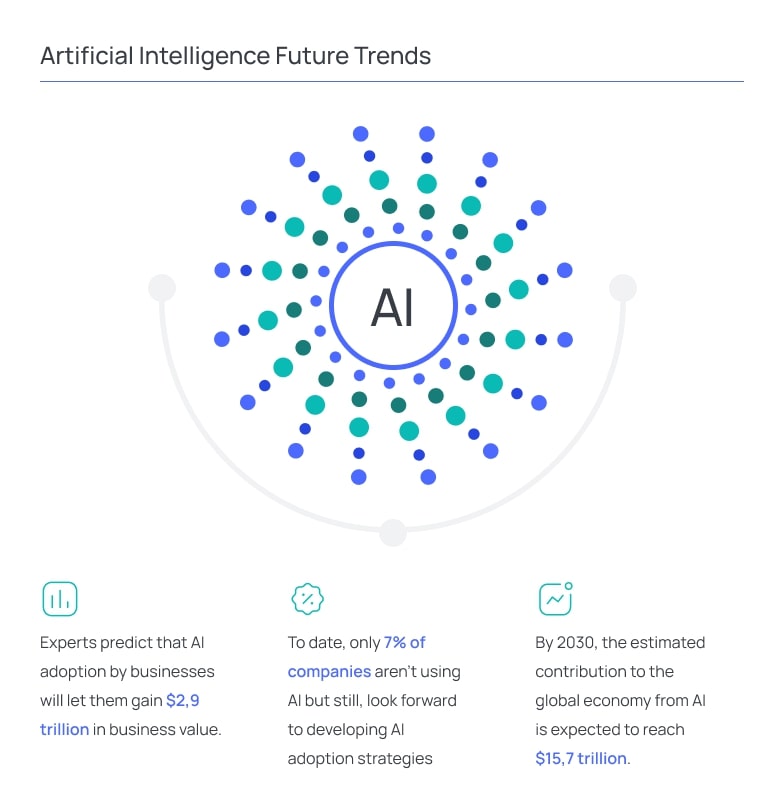
The importance of artificial intelligence in business is expected to grow. Below are some of the prominent trends that will contribute to AI development and adoption by businesses in a great way.
The Rise of Conversational AI
Gartner has featured the use of voice assistants as one of the most impactful tech trends for 2024 and beyond. Both businesses and users have already appreciated the convenience of this approach for streamlining everyday tasks, improving efficiency, and providing customers with the experience they would like to have. According to Accenture, 94% of voice technology users believe it significantly improves the quality of their life, while 44% of them use smart devices to manage their homes with voice.
Thinking about creating an interactive chatbot for your business and helping your customer better solve their issues?
We Are Here to Help!Robotic Processes Adoption
This is another impactful trend, and the recent pandemic is expected to speed up the process of robotic solution adoption with the aim of reducing face-to-face contacts, replacing employees engaged in routine tasks, and cutting costs.
Internet of Everything
Internet of Everything means adopting IoT, AI, and blockchain technologies for most everyday operations – from smart parking to smart hospitals and public safety solutions. This is quite a promising direction for AI development but the creation of the Internet of Everything ecosystem will require quite a large infrastructure deployment and careful legal regulation.
Final Thoughts
Adopting artificial intelligence, machine, and deep learning is a cutting-edge opportunity to streamline and optimize business processes, reduce the ecological footprint, cut costs and provide the customer with an innovative experience. What’s more, AI is quite a versatile technology and its capabilities may be perfectly tailored to a specific business task. Binerals tech team has hands-on experience with custom AI solutions development for different industries so you are welcome to get in touch with us for help!
Ready to innovate?
Schedule a Call